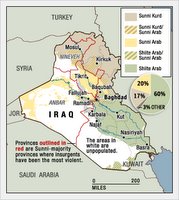 The results of the December 15 election of a permanent parliament are not yet finalized. Counting, complaints of fraud and voter abuse are still being processed. A number of independent groups are also assessing the election outcome, which will probably not be announced for at least two more weeks.
The results of the December 15 election of a permanent parliament are not yet finalized. Counting, complaints of fraud and voter abuse are still being processed. A number of independent groups are also assessing the election outcome, which will probably not be announced for at least two more weeks.My own "worst case" prediction is that there will be a theocracy akin to the one in Iran installed. The Sunnis and secular Shiites who were left out will continue their vehement protests, marked by violence. Independent militias will fight amongst themselves and the Kurds will separate from the rest of Iraq. That will scare Turkey to death and tensions between them will rise. The U. S. will declare the election a "Victory!" and begin to draw down the troop levels.
The part I am unsure about is whether the new Shiite government will ask the U.S. to withdraw completely from all of their bases, originally established for a permanent United States foothold in the Middle East. I think there is a good chance they will demand withdrawal because of the protection a closely allied, anti-American Iran will offer.
I am as yet unable to offer a best case scenario. I'll leave that for the current administration.
Here is a quick news roundup from Iraq -
According to the BBC, an independent group will visit Iraq to look at the recent election results.
A team of international monitors has said it is ready to visit Iraq to review complaints that parliamentary elections held this month were unfair. The monitors' offer has been welcomed by leading Sunni Arab and secular Shia parties, who have alleged that the vote was marred by fraud and intimidation. US Secretary of State Condoleezza Rice and the UN also welcomed the proposal. Early results suggest governing Shia parties have won the biggest share of the vote, followed by Kurdish groups. The United Iraqi Alliance, the religious Shia bloc that heads the current government, held talks on Thursday with Kurdish leaders about forming a possible coalition. The final result for the 15 December vote is not expected until early January.
This US News & World Report story elaborates on details, including this interesting section,
The presence of two Arab experts on the International Mission for Iraqi Elections team could go far in helping to convince Iraqis that the review of the vote will be fair. The team will also consist of a Canadian and a European. The independent group said it helped monitor the elections in Baghdad and was "assisted by monitors from countries of the European Union working under IMIE's umbrella." The team will travel to Iraq at the invitation of the Iraqi election commission - a pointed noted by Secretary of State Condoleezza Rice. "The Electoral Commission has once again demonstrated its commitment to fair and credible elections that meet international standards," Rice said in a statement welcoming the invitation to the independent team.
The election results have extremely wide potential repercussions, according to this Aljazeera story.
Experts predict that the formation of a new Iraqi government, following a year of political reforms, will help stabilize the country, revive its stagnant economy and pave the way for contentious measures such as privatization. Thomas Delare, counselor for economic affairs at the US embassy in Baghdad, said: "Ordinary Iraqis, domestic entrepreneurs and foreign investors have all been waiting for stability, predictability and greater security,".
The 15 December general election "doesn't guarantee any of those things, but it 0ffers the promise that now we can put it in place.", he said.
That all depends on the smooth formation of the next government which - as various political factions dispute the results, march in the street and threaten to boycott the
new parliament - does not seem a certainty.
DailyKos' "Georgia 10" blogs about US military plans to increase the oversight of Iraqi troops by raising the number of troops assigned to work with them in order to prevent prisoner abuse. "One step forward, two steps back," is how the blogger characterizes the move.
Iraqi in America, "Fayrouz", discusses the current state of affairs in Iraq utilizing her excellent resources, closing with this,
This is why me and most educated Iraqis are very worried. We've seen these acts
during Saddam's dictatorship and here's Hakim and the rest of that group
repeating THAT same brutal history.
TPM Cafe's "Max Sawicky" blogs about the implications of the election results.
My summary of the election results would be that the winners were a dizzying array of parties that oppose U.S. interests. The losers were a thin veneer of secular, moderate, and liberal pro-U.S. forces. A strong state run by the latter would indeed be an achievement for U.S. policy. But that is not what is happening. In political terms, the liberalizing forces are hanging on by their fingernails, what fingernails they have left in light of Shi'ite justice. (For the sake of argument, we ignore for the moment that among these pro-U.S. forces are abject crooks like Ahmed Chalabi.)
Instead we're getting an intolerant, theocratic, pro-Iranian state that is emphatically not aligned with the U.S. national interest, as conceived in conventional, narrow terms by the so-called "realist" school of foreign policy. The only moderating force is the Kurdish block, whose positive role stems completely from their own self-interest, rather than any intrinsic pro-U.S./pro-Western orientation.
Tags: Iraq election Middle East foreign policy Iraq war terrorism
No comments:
Post a Comment